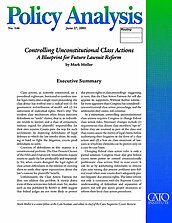Class actions, as currently constituted, are a procedural nightmare. Instituted to combine similar legal claims into a single court proceeding, the class device has evolved into a radical tool (1) for government redistribution of wealth and (2) for subversion of individual rights. Here’s why: The modern class mechanism often forces innocent defendants to “settle” claims, that is, to redistribute wealth to lawyers and a class of consumers, without regard for plaintiffs’ responsibility for their own injuries. Courts pave the way for such settlements by depriving defendants of legal defenses to which the law entitles them. By making it hard to fight the litigation, courts prod defendants to settle.
Coercion of defendants in this manner is a constitutional problem. The Due Process Clauses of the Fifth and Fourteenth Amendments require courts to apply the law predictably and impartially. Yet, when courts disregard the legal rights of class action defendants in the interest of coercing them to settle, they upset expectations about the law’s content for plaintiffs’ benefit.
Unfortunately, the Class Action Fairness Act does not address this problem. It merely draws more of these actions into federal court. Yet, studies such as one published by RAND in 2000 suggest that federal judges are not more likely to protect due process rights in class proceedings — suggesting, in turn, that the Class Action Fairness Act will disappoint its supporters. Without further reform — far more aggressive than Congress has considered — unconstitutional class action proceedings, and the settlements they coerce, will continue.
At a minimum, controlling unconstitutional class actions requires Congress to change federal class action rules. Necessary changes include (1) requirements that absent class members “opt in” before they are counted as part of the class and that courts assess the merits of legal claims before authorizing their litigation in the form of a class action and (2) a ban on class treatment of lawsuits in which key elements can be proven only on a case-by-case basis.
Changing federal class action rules is only a partial solution. Congress must also give federal courts more power to control constitutionally problematic class actions filed in state court. It can do so by authorizing defendants to remove class suits raising due process problems into federal court when state courts don’t adequately protect litigants’ due process rights. The latter reform not only is consistent with the Supreme Court’s understanding of federalism and separation of powers but will give states greater incentives to reform their local class action procedures.

This work is licensed under a Creative Commons Attribution-NonCommercial-ShareAlike 4.0 International License.

